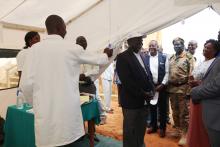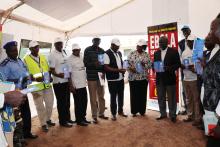South Sudan intensifies Ebola preparedness in response to the outbreak in Democratic Republic of Congo
Juba, 6 September 2018 – In the aftermath of the Ebola virus disease (EVD) outbreak in the Democratic Republic of Congo (DRC) that started in North Kivu province, on 1 August 2018 and the threat of cross-border spread, South Sudan has heightened its preparedness and response activities.
In an effort to strengthen preparedness and response activities, the Ministry of Health with support from WHO, Center for Disease Control (CDC) and other partners engaged in a series of strategic leadership and multisectoral response activities. These include the activation of multi-sectoral Ebola taskforce at all levels, advocacy with key leaders at the national level; donors; humanitarian partners; state and county level leadership and other stakeholders.
South Sudan is one of the four high-risk countries (Burundi, Rwanda, South Sudan, Uganda) prioritized by WHO to enhance preparedness and operational readiness based on the proximity to the outbreak area as well as the capacity to manage EVD outbreaks.
As part of the advocacy needed to engage policymakers and mobilize ample resources to support EVD preparedness and response, a high-level mission comprising of Ministry of Health (MOH), WHO, and key stakeholders including Ministry of Wildlife Conservation and Tourism, Ministry of Interior Affairs, the Medical Corps among othrs visited the high-risk states of Yei River, Torit, Maridi, Gbudue, and Tambura from 31 August to 6 September 2018.
Two entry points, Nimule in Torit State and Gangura in Gbudue State were also visited to assess level of preparedness and support the Ebola screening at the port of entry. These visits were intended to assess and support local preparedness efforts, understand challenges to be addressed and exchange views on streamlining stakeholders’ collaboration for optimal EVD preparedness and response.
“To manage the risk posed by South Sudan’s complex humanitarian context, the history of previous EVD outbreaks, increasing global travel and proximity to DRC, implementation of effective public health measures is critical,” says Honorable Dr Riek Gai Kok, the Minister of Health.
Critical gaps such as the need to establish Ebola treatment centers with optimal infection prevention and control (IPC), dedicated ambulance services, and adequate personal protection equipment have been identified during the high level mission. The team also identified the need for specialized training in EVD case management, safe and dignified burials, and contact tracing.
“Although South Sudan has not confirmed any EVD case, the disease remains a national and regional threat”, says Mr Evans Liyosi, WHO Representative a.i. for South Sudan.
The statistics from the current Ebola outbreak in DRC, show that 6 out of 10 cases have died. Hence, given the virulence of the virus, the current transmission patterns, and the weak health systems in DRC and South Sudan, it is vital to strengthen national capacities for effective preparedness and response especially at designated points of entry, Mr Liyosi underscored.
As a priority one country for EVD preparedness, South Sudan activated multi-sectoral Ebola taskforce and an incident manager has been designated to coordinate the preparedness and response activities. Taskforce meetings convene twice a week in the Public Health Emergency Operation Center (PHEOC) to review and monitor the implementation of the Ebola contingency plan for South Sudan.
Mr Liyosi also highlighted WHO’s commitment to strengthen national core capacities to effectively implement the International Health Regulations (IHR, 2005).
The Hon. Minister, Dr Kok appreciated WHO and other partners for the strong partnership and support rendered to enhance capacities to address the threats of EVD and other infectious diseases.
The Governors of the respective states, as well as the state Health Ministers reiterated their commitment to institute key interventions and increase public awareness by providing adequate information through all communication channels, religious and community leaders.
WHO is working in Jubek, Gbudue, Tambura, Maridi, Torit, Wau and Yei River states alongside their respective state health ministries and partners to provide strategic public health leadership and support required to ensure that all the high-risk counties are operationally ready and prepared to implement timely and effective EVD risk mitigation, detection, and response measures.
Tel : +211923362401
Email: wamalaj [at] who.int (wamalaj[at]who[dot]int)
Communications Officer
WHO Rwanda
Mobile: +250 795 450 856
Email: ebrahimj [at] who.int (ebrahimj[at]who[dot]int)




